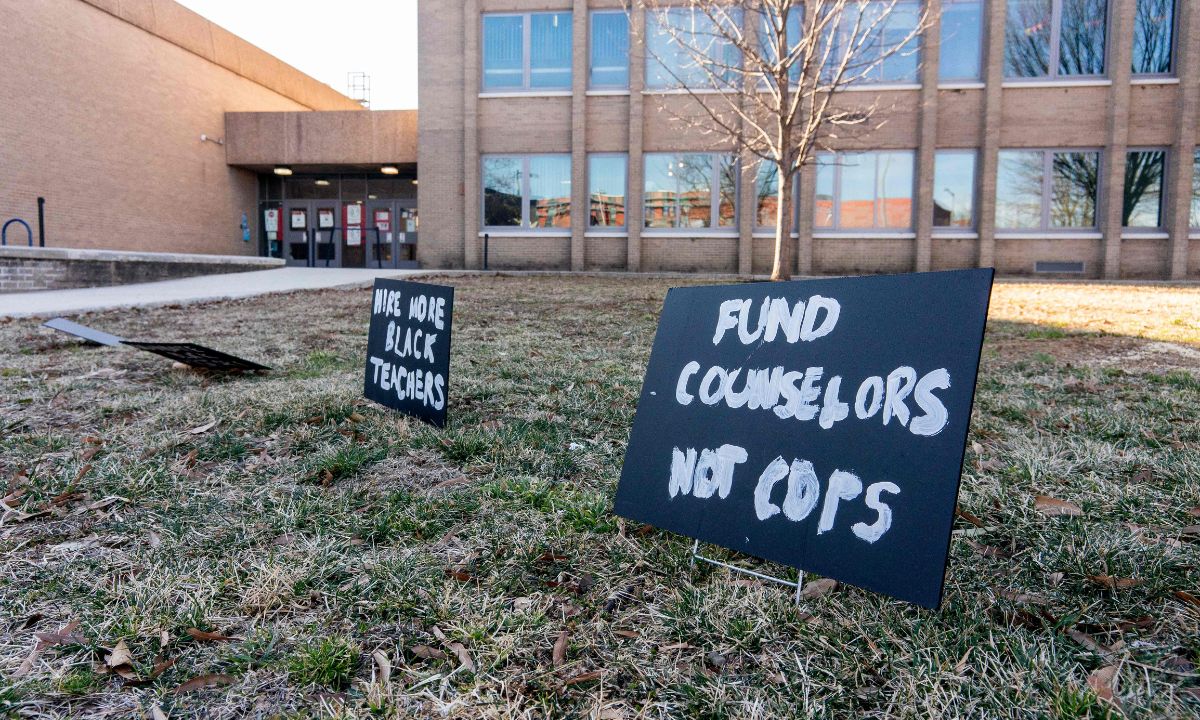Ed Dept. Axes $1B Mental Health Program Designed to Thwart School Shootings
The grant program, which helped train school counselors, is the latest target in Trump’s war on DEI.

Get stories like this delivered straight to your inbox. Sign up for The 74 Newsletter
Updated
The latest casualty in President Donald Trump’s war on diversity, equity and inclusion is a $1 billion federal grant program to train school counselors and thwart mass shootings.
The U.S. Department of Education notified grant recipients this week it was ending funds to train and hire K-12 school mental health professionals included in a 2022 law that passed with bipartisan support following the mass shooting in Uvalde, Texas, which led to the deaths of 19 elementary school students and two teachers.
The grants, which were included in a bipartisan gun control law approved by then-President Joe Biden, don’t align with the Trump administration’s goals, according to a “notice of non-continuation” sent to grant recipients Tuesday evening and obtained by The 74. Grantees include local school districts, state education agencies and colleges tasked with training some 14,000 mental health professionals and placing them in K-12 schools in virtually every state.
“Those receiving these notices reflect the prior Administration’s priorities and policy preferences and conflict with those of the current administration,” Murray Bessette, a senior advisor in the Education Department’s Office of Planning, Evaluation and Policy Development, wrote in the letter. Affected programs, Bessette wrote, “violate the letter or purpose” of federal civil rights laws, run counter to the department’s priority on “excellence in education” and “undermine the well-being of the students these programs are intended to help.”
Proponents of the grant program said they were caught off guard by the move, especially since Republican leaders, including Trump, have attributed the unprecedented surge in school shootings to a student mental health crisis.
“Ending these mental health investments will hurt students and families and make our schools less safe,” Mary Wall, who was the Education Department’s deputy assistant secretary for P-12 education during the Biden administration, told The 74. “It’s not an exaggeration to say that mental health supports save lives.”
An Education Department spokesperson confirmed it would not renew $1 billion in grants, a move that appears to impact the entirety of the largest-ever federal effort to train school mental health professionals included in the 2022 Bipartisan Safer Communities Act. The law also created the first significant federal gun control measures in decades, including background checks on firearm purchases for anyone younger than 21 years old.
Spokesperson Madi Biedermann said in a statement the grants didn’t live up to their goal of improving schools’ mental health support services — and suggested the cuts were part of a broader Trump administration effort to derail programs that support diversity, equity and inclusion in education.
“Under the deeply flawed priorities of the Biden Administration, grant recipients used the funding to implement race-based actions like recruiting quotas in ways that have nothing to do with mental health and could hurt the very students the grants are supposed to help,” Biedermann said.
Biedermann’s statement echoed a social media post by conservative pundit Christoper Rufo, who turned to X this week to accuse the Biden administration of using the grants “to advance left-wing racialism and discrimination.”
“No more slush fund for activists under the guise of mental health,” wrote Rufo, a senior fellow at the Manhattan Institute. Rufo didn’t immediately respond to a request for comment from The 74.
Wall said the Education Department during the Biden administration “offered a voluntary competitive priority” to applicants who worked to ensure mental health professionals reflected the school communities they serve, but rejected the idea that the grants were a DEI initiative. Instead of creating a plan to support students’ well-being, she said the Trump administration has sought to “rob school districts who have made important groundwork to have clinical services available to children and interrupt them midstream.”
“We in no way required any of this to be focused on race or gender or sexuality or anything,” Wall said. “We were deliberately looking to set these up to be long-lasting, high-impact programs, where we would get the maximum amount of benefit.”
Sen. Chris Murphy, a Democrat from Connecticut who introduced the 2022 law, accused the Trump administration Thursday of killing the grant program “in order to fund a giant tax cut for the crazy wealthy.”
“I thought we had a bipartisan consensus around trying to support kids with really serious traumas and mental illnesses with support services in our schools,” Murphy said in a statement to The 74. “But there’s not consensus on anything that helps people in this administration.”
Lauren Levin, the chief advocacy officer at the nonprofit Sandy Hook Promise, said the cuts hinder students’ access to those services in schools that are already under-resourced. Though the degree to which mental health care and mass shootings intersect has been long debated, the pandemic exacerbated student rates of depression, anxiety and loneliness.
Nationally, there is an average of about 376 students per school counselor, significantly lower than the 250-to-1 recommended by the American School Counselor Association. School psychologists are even more limited, with a national average of 1 for every 1,127 K-12 students, according to the American Psychological Association.

“After school shootings, we hear a lot of important conversations about the mental health needs and gaps in this country for youth,” including from Republican lawmakers, Levin told The 74. “In many of these cases with these grants, it means children who are currently receiving mental health services in schools are going to stop getting that help.”
In the first few months of the Trump administration, several federal initiatives designed to prevent mass school shootings have faced a similar fate. A 26-person committee of violence prevention experts — also approved as part of the Bipartisan Safer Communities Axe — was gutted.
Levin said Sandy Hook Promise, founded after the 2012 mass shooting in Newtown, Connecticut, has also begun to track cuts to grants authorized under the federal STOP School Violence Act. Trump approved that law in 2018 in response to the high school shooting in Parkland, Florida, which resulted in the deaths of 17 people. So far, Levin said they’ve documented cuts to about a dozen grant recipients totaling nearly $20 million, including funding designed to help schools address social isolation among students and prevent bullying.
“One of the reasons that students or any of these shooters are not getting the help that they need is that we have a gap in access to mental health care,” said Levin, who noted that schools are among the most consistent places for young people to get help.
“If someone is showing signs of wanting to hurt themselves or others, if they are socially isolated, if we see changes in behavior and if there is a school counselor, that school can be their lifeline,” Levin said. “That could make all the difference.”
Get stories like these delivered straight to your inbox. Sign up for The 74 Newsletter

;)
